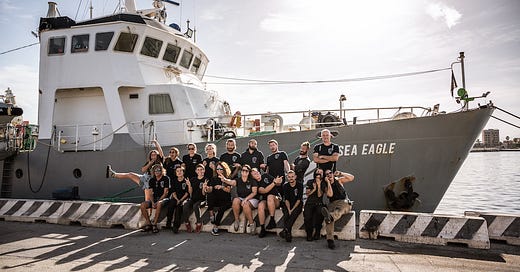Dear earthlings,
Wishing you a harmonious start of the Gregorian calendar’s new year. If the fresh start feels out of sync, it’s probably because it is…! If we followed nature’s rhythms and cycles then the new year would be in Spring 🌸
🗞️ In Climate News
🇸🇮 Cave flood in Slovenia traps five people after heavy rain.
🇫🇮 Finland avalanche leaves two dead as extreme cold grips Nordic countries.
🇰🇪 Climate change in Kenya is causing a surge in diseases like malaria.
🇨🇬 Congo declares state of emergency over devastating floods and landslides.
🇧🇷 Two Yanomami men shot dead by illegal goldminers on Yanomami land.
💨 US to approve ‘carbon mega bomb’ that would be equivalent to the entire emissions of the EU.
📈 Cool Trends
♾️ eco-story
⚓️ Neptune’s Navy
Three months ago, I boarded a Sea Shepherd ship, the Sea Eagle, in Paola, Calabria, in southern Italy.
Sea Shepherd Global is an NGO that protects wildlife and combats illegal fishing in direct-action campaigns around the world. You might have heard of them as the good pirates of the sea. Today its fleet, also known as Neptune’s Navy, is made up of twelve refurbished fishing vessels, each crewed by volunteers that share a deep love for the ocean and defending its voiceless creatures.
I had traveled by train from Florence and by the time I made it to the ship it was nightfall, past dinner time. Most of the crew was already asleep but the First Officer, Yuval Elroy, had stayed awake to greet me and offer me some delicious plant-based food. As I ate, we got to know one another, and towards the end of our conversation, I asked Yuval what was the plan for the following day?
“Removing longlines from dawn ‘til dusk.”
For the last six years Sea Eagle’s Operation Siso has been focused on removing abandoned longlines, octopus traps and FADs (fish aggregating devices) from the Mediterranean. The campaign has proved to have decreased illegal fishing in Calabria by 70 percent.
🌏 The Culture Column
📺 What we’re watching:
📸 Profile of the week: @intersectionalenvironmentalist
📖 What we’re reading: Humanity's Moment : A Climate Scientist's Case for Hope, Joëlle Gergis.
🤯 Fun fact we learnt this week: In reef island formation, such as in the Maldives, 85% of the sand is produced by parrot fish.






